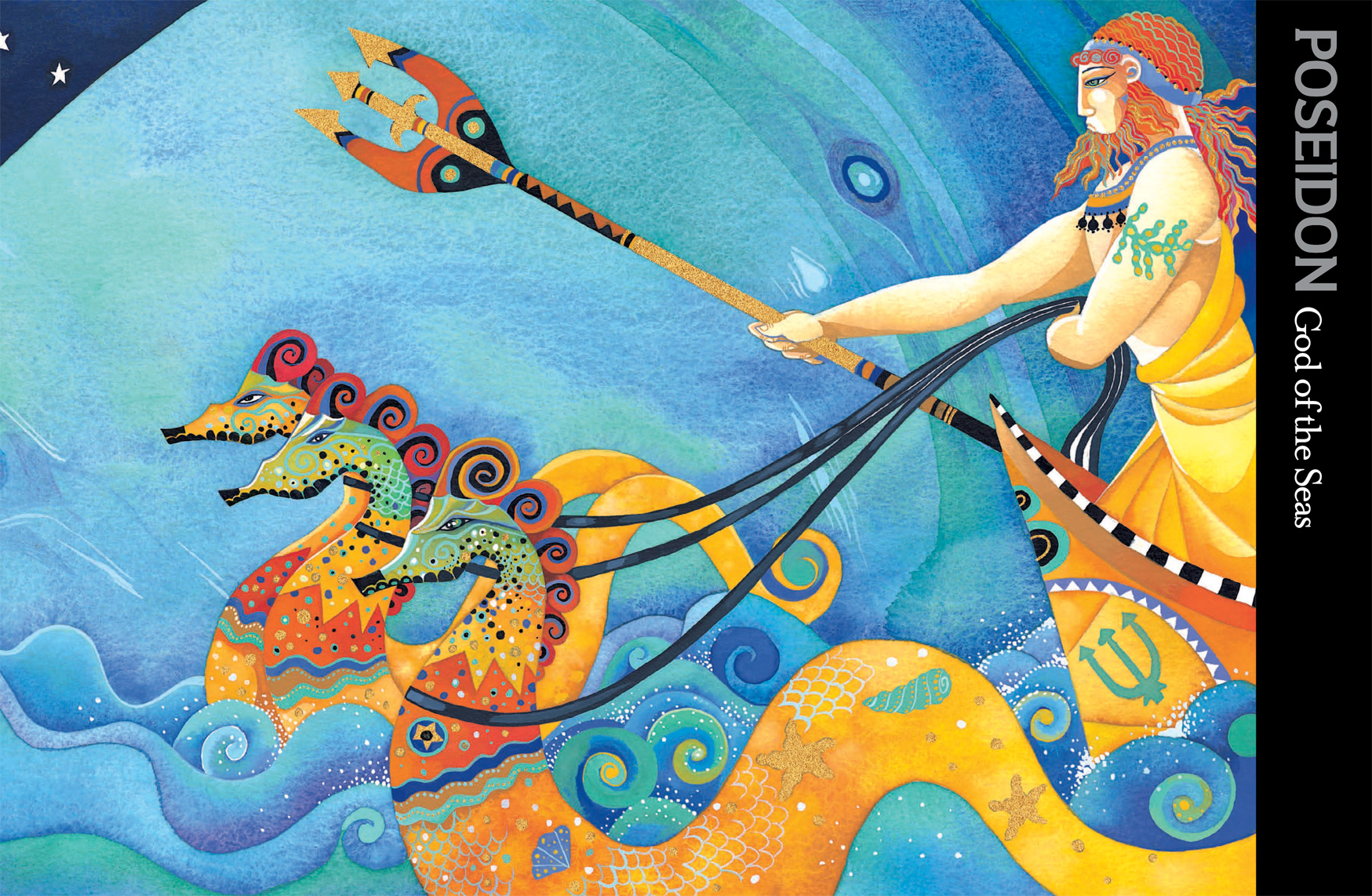


Poseidon, along with his brother Hades, and his sisters Hestia and Demeter and Hera, was swallowed at birth by his father Cronus. Then a sixth child, Zeus, who was never swallowed, and thus had never known humiliation, freed them. Poseidon sized things up: Zeus was a force to be reckoned with—that was the guy to follow.
For ten long years, the six brothers and sisters fought their father and aunts and uncles—the mighty Titans. It was a nasty war, but what war isn’t? Poseidon gritted his teeth and did his part. He was no coward, after all. He donned armor and went dutifully into battle. He never lagged.
But now and then there was a lull in the battle, perhaps because Zeus got distracted or because the Titans, despite their huge size, needed a rest. Who knew? No one ever explained things to Poseidon. Whatever the case, Poseidon was grateful, and in those moments he took refuge in visiting Pontus, the ancient god of all the waters, the partner to his grandmother Gaia, Mother Earth, and his grandfather Uranus, Father Heaven. He swam in Pontus’ waters, and, despite how badly his life had gone so far, despite all the time locked up in his father’s belly, despite all the long years of savage war, he was happy. He found joy in the buoyancy of diving whales, he found beauteous rhythm in the undulating wake of eels, he found humor in the scuttling of crabs.
Best of all, Poseidon found a friend in the oldest son of Pontus and Gaia. His name was Nereus, and he loved the watery depths as much as Poseidon did. Together they plunged to the corals and sponges that lived on the seabed. They rode on the backs of turtles. They flapped their arms like the rays they followed, then let them hang with their legs moving at the whim of the currents like the tentacles of the nearly transparent jellyfish.
But then it was back to war, until the glorious moment when the hundred-handed sons of Gaia joined the battle on Zeus’ side, and then the Cyclopes gave Zeus the thunderbolt and Hades the helmet that made him invisible and Poseidon the trident. It worked, that trident. It worked splendidly. Poseidon struck it on the ground and the earth shook, boulders tumbled to the sea, rivers overflowed their banks. Ha! The Olympian gods won.
And Zeus appointed Poseidon ruler of the seas. Poseidon knew his brother felt the seas were an inferior realm to rule. Ha again! Nothing could have pleased Poseidon more.
WATER Gods
Many gods ruled the waters beside Pontus, Nereus, and Poseidon. Poseidon’s son Triton trumpeted the noises of moving water. His son Proteus changed shape at will—as seas seemed to do to the ancient Greeks. The Titan Oceanus was a continuous water loop: the connected system of the Earth’s five oceans. Then there were saltwater nymphs (Nereids), freshwater nymphs (Naiads), and three mortals who became sea divinities. The variety of gods may reflect ancient Greek knowledge of the complexities of the water systems.

With his black mane flying out behind him, he swam the seas in search of those who might need his help. It was a welcome antidote to that tedious war. And when he wasn’t patrolling, he let himself be absorbed in the watery mysteries.
That’s when he discovered the finest mystery ever. She was the granddaughter of Pontus and Gaia, and the daughter of the lordly sea god Phorcys and the lovely cheeked sea goddess Ceto. That heritage made her the perfect wife in Poseidon’s eyes. She was one of three sisters, called the Gorgons. The other two sisters were immortal, like the gods. But Medusa, as she was called, was mortal.
Poseidon found her mortality that much more alluring. She was vulnerable. How amazing to know someone vulnerable. He put his arms out and let the serpents of her hair swarm around them. Good! Those serpents could bite and poison—good protection. He gingerly touched the wings that jutted from her shoulder blades. Good good! Those wings could carry her far from an attacker. He stroked her scales. Ah, very good indeed! They were harder than armor. And most assuring of all, she had a special power: Anything mortal that looked directly at her face would turn instantly to stone. That should do it.
And so Poseidon felt almost safe in loving Medusa. They reveled together in his sea kingdom. At least for a while.
Humans who viewed Medusa’s ugly face turned to stone. Yet Poseidon found her wonderful and fell passionately in love, caressed by her serpent hair in the deep ocean waters.
